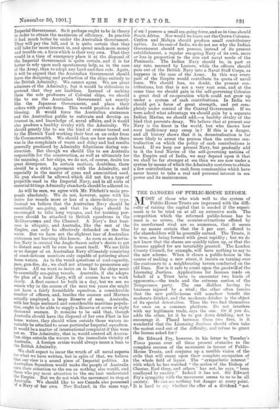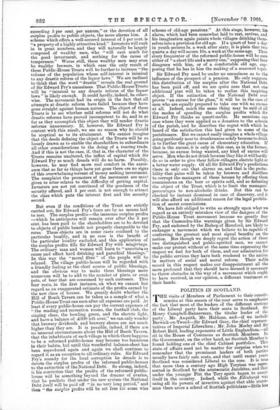THE DANGERS OF PUBLIC-HOUSE REFORM.
MOST of those who wish well to the system of Public-House Trusts are impressed with the diffi- culty of raising the capital that is needed if the experi- ment is to be tried on at all an extensive scale. The competition which the reformed public-house has to meet is so severe, the counter-attractions offered by its unreformed rival are so numerous, that it seems by no means certain that the 5 per cent. offered to the shareholders will be generally earned. The Trusts, it is true, are being formed with great rapidity ; but we do not know that the shares are quickly taken up, or that the licenses applied for are invariably granted. The London County Council, for example, will have nothing to say to the new scheme. When it closes a public-house in the course of maki 0. a new street, it insists on turning over the customers to a neighbouring tavern conducted on the old lines. Nor is it safe to count upon the goodwill of the Licensing Justices. Applications for licenses made on behalf of a Trust have to encounter two Irinds of opponents,—the trade and the extreme section of the Temperance party. The one dislikes having its business injured by a rival ; the other often fancies that the new public-house will somehow benefit the moderate thinker, and the moderate drinker is the object of its special detestation. Thus the two find themselves for once on a common platform. Do not interfere with my legitimate trade, says the one. Or if you do, adds the other, let it be to put down. drinking, not to encourage it. Placed between these two fires, is it wonderful that the Licensing Justices should often take the easiest road out of the difficulty, and refuse to grant the license asked for ?
Sir Edward Fry, however, in his letter to Tuesday's Times passes over all these present obstacles to the complete success of the movement in favour of Public- House Trusts, and conjures up a terrible vision of the evils that will ensue upon their complete occupation of the whole field of liquor. The " sympathetic interest " with which he has watched " the action of the Bishop of Chester, Earl Grey, and others " has not, he says, " been unalloyed by anxiety." Indeed it has not. Sir Edward Fry's sympathy with the movement seems to us to be all anxiety. He can se3 nothing but danger at every point. It is hard to sny whether the offer of a dividend " not exceeding 5 per cent. per annum," or the devotion of all surplus profits to public objects, the more alarms him. A scheme which offers a well-secured interest of 5 per cent. is "a property of a highly attractive kind." Investors will rush in in great numbers, and they will naturally be largely composed of wealthy men, who " will care much for the good investment, and nothing for the cause of temperance." Worse . still, these wealthy men may even be wealthy brewers, in which case the only result of these Public-House Trusts will be further to increase " the volume of the: population whose self-interest is inimical to any drastic reform of the liquor laws." We are inclined to think that the word " drastic " reveals the real ground of Sir Edward Fry's uneasiness. That Public-House Trusts will be "inimical to any drastic reform of the liquor laws " is likely enough. It could hardly, indeed, be other- wise. The movement had its origin in the fact that all attempts at drastic reform have failed because they have gone straight against human nature. The object of these Trusts is to see whether mild reforms will not do what drastic reforms have proved incompetent to do, and in so far as they accomplish this object they will render drastic reforms unnecessary.' If, however, Sir Edward Fry is content-with this result, we see no reason why he should be sceptical as to its attainment. We cannot imagine that the deeds defining the object of the Trusts will be so loosely drawn as to enable the shareholders to subordinate all other considerations to the doing of a roaring trade. And if this is not the case, if, that is, the character of the Trusts remains unaltered, the influx of capital which Sir Edward Fry so much dreads will do no harm. Possibly, however, he may find more real comfort in the assur- ance that so far as things have yet gone there are no signs of this overwhelming torrent of money seeking investment. The complaint the promoters of the movement are most given to utter relates to the difficulty of getting capital. Investors are not yet convinced-of the goodness of the security offered, and 5 per cent. is not enough to attract the -class which puts the interest first and the security second.
But even if the conditions of the Trust are strictly carried out, Sir Edward Fry's fears are by no means laid to rest. The surplus profits—the immense surplus profits --Which he anticipates will remain over after the 5 per cent. has.been paid to the shareholders are to be devoted to objects of public benefit not properly chargeable to the rates. These objects are in some cases confined to the particular locality, and in no case is the benefit of the particular locality excluded, and this application of the surplus profits fills Sir Edward Fry with misgivings. The ordinary man and woman will learn to " a,ssociata as cause and effect hard drinking and parochial blessings." In this way the " moral fibre " of the people will be relaxed. The village public-house will be regarded with a friendly feeling as the chief source of public blessings, and the obvious way to make these blessings more numerous will be to add to the number of pints, or even pots, of beer that are consumed by each customer. This fear rests, in the first instance, on what we cannot but regard as an exaggerated estimate of the profits earned by the new class of houses. We greatly doubt whether the Hill of Beath Tavern can be taken as a sample of what a Public-House Trust can earn after all expenses are paid. At least if every public-house can pay the current expenses of " the reading and recreation rooms, the football club, the singing class, the bowling green, and the electric light, and have a balance of- £300 left over," we can only wonder that brewery dividends and brewery shares are not much higher than they are. It is possible, indeed, if there are no unusual circumstances about the Hill of Beath Tavern, that the inhabitants of each village in which there happens to be a reformed public-house may become too luxurious in their habits, but until this wonderful balance-sheet has been reproduced again and again we shall continue to regard it as an exception to all ordinary rules. Sir Edward Fry's remedy for the local corruption he dreads is to devote the surplus profits of the reformed public-houses to the extinction of the National Debt. So strong, indeed, is his conviction that the profits of the reformed public- house will be something beyond the dreams of avarice, that he predicts that under the new system the National Debt itself will be paid off " in no very long period," and then " the surplus profits will be set free for some wise scheme of old-age pensions." At this stage, however, hie alarm, which had been somewhat laid to rest, revives, and his imagination again paints whole villages drinking them- selves into a provision for old age. If a quart of beer a day in youth secures 5s, a week after sixty, it is plain that two quarts a day will secure. I0s. a week at the same age. Thus every frequenter of the reformed public-house will be sure either of "'a short life and a merry one," supposing that beer disagrees with him, or of a comfortable old age, sup- posing that he has in him the making of a seasoned toper.
Sir Edward Fry need be under no uneasiness as to the influence of the prospect of a pension. He only suggests this distribution of the surplus after the National Debt has been paid off, and we are quite sure that not one additional pint will be taken to realise this inspiring object. If the extinction of the National Debt ever proves " an excuse for the glass," it will be in the case of men who are equally prepared to take one with no excuse at all. Indeed, much the same thing may be said of all the modes of spending the surplus profits which Sir Edward Fry thinks so questionable. He mentions one case where they were applied as a donation to the schools of the parish, and he describes the regret with which he heard of the satisfaction this had given to some of the parishioners. But we cannot easily imagine a whole village going perilously near to drunkenness solely because to drink is to further the great cause of elementary education. If that is the excuse, it is only in this case, as in the former, because, no excuse being wanted, any kind of excuse will serve. Men who d6 not drink because they like it will hardly do so in order to give their fellow-villagers electric light or a better water supply. Of all Sir Edward Fry's predictions there is only one that alarms us, and that is the proba- bility that pains will be taken by brewers and distillers to corrupt the managers of these houses by offering them commissions on the beer or spirits sold, and so defeating the object of the Trust, which is to limit the managers. percentages to non-alcoholic drinks. But this can be checked by instant dismissal in case of discovery, and it will also afford an additional reason for the legal prohibi- tion of secret commissions.
We have felt obliged to write so strongly upon what we regard as an entirely mistaken view of the dangers of the Public-House Trust movement because we greatly fear that the Cassandra-like warnings given by Sir Edward Fry, and endorsed by the Bishop of Hereford, are likely to endanger a movement which we believe to be capable of conferring the greatest and most signal benefits on the nation. But though we deeply regret the action of these two distinguished and public-spirited men, we cannot make our protest without at the same time expressing the respect we feel for both of them, and our admiration for the public services they have both rendered to the nation in matters of social and moral reform. Their noble record in this respect makes our disappointment all the more profound that they should have deemed it necessary to throw obstacles in the way of a movement which ought to have received, in our opinion, a different treatment at their hands.















































 Previous page
Previous page